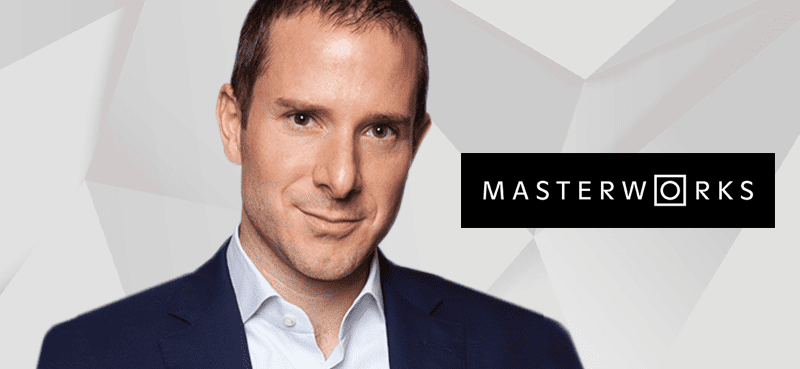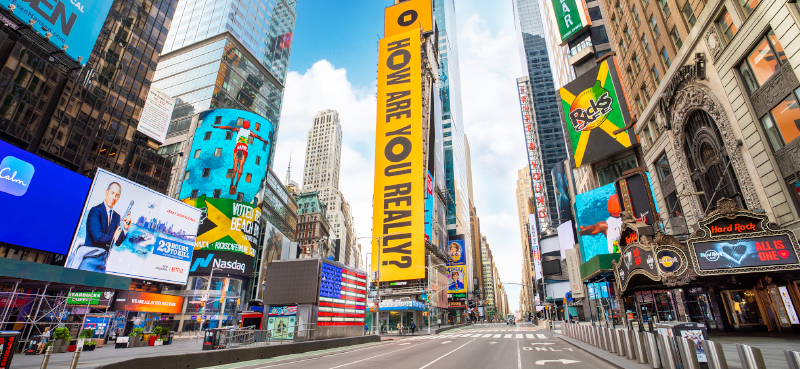Scott Lynn, founder and CEO of Masterworks, returns to the podcast to discuss the incredible growth in blue chip art tokenization.
Scott explains what led him to create Masterworks… and why it’s the perfect platform for Main Street investors looking to break into the art world. He also highlights how fine art outperformed most “traditional” asset classes last year.
Next, we break down the simple process of opening a Masterworks account… how tokenization works… how profits are divided among investors… and Scott’s plans to take the company public.
Masterworks is seeing a ton of demand, and has created a waitlist to keep up. But as a Curzio reader, you can skip the waitlist and start building your fine art collection today. Here’s how.
Tomorrow, I’ll be releasing a special interview with a guest who’s built an incredible network of business minds and celebrities… and shares his secrets to leveling up your personal and business relationships. I’ll also be making a big announcement about upcoming changes to Wall Street Unplugged and The Dollar Stock Club. Stay tuned…
- What motivated Scott to start his own company [5:48]
- How Masterworks makes fine art available to all investors [9:13]
- Masterworks’ process—from finding art to paying shareholders [11:15]
- How Scott is educating the masses about tokenization [17:49]
- Start building your fine art portfolio today [23:50]
- Look for a special interview—and a big announcement—tomorrow! [28:55]
Wall Street Unplugged | 1002
How Main Street investors can start building a fine art portfolio
Announcer: Wall Street Unplugged looks beyond the regular headlines heard on mainstream financial media to bring you unscripted interviews and breaking commentary direct from Wall Street right to you on Main Street.
Frank Curzio: How’s it going out there? It’s February 2nd. I’m Frank Curzio, host of the Wall Street Unplugged podcast, where I break down the headlines and tell you what’s really moving these markets. Believe it or not, I have another great interview set up today. And it’s with Scott Lynn, the founder and CEO of Masterworks. So, you heard me mention Masterworks this week; they’re sponsoring Wall Street Unplugged. As you know, I don’t have a lot of sponsors, I very rarely have sponsors actually on this podcast, unlike every other podcast in the world. So when I do, it’s only for companies I fully support, companies I use their products or their platforms, and companies that I trust. But Scott and I go back about two years. I interviewed him on this podcast in… I believe it was 2021. And he just launched his platform like a year earlier that tokenizes contemporary art, and this is art that’s usually only available to the ultra-wealthy.
Frank Curzio: He bought these big art pieces, he put in the house, but he found a way to bring this to everyday people, mom and pop investors to invest in this amazing asset class. And he did it by tokenization, which you all should be familiar with at least, right? That’s what he did with Curzio Research. And tokenization is selling a piece of an asset. So, investors get fractional ownership. And why would you do that? Because sometimes a private company or sometimes a commercial real estate project, it’s an illiquid asset. And when it’s an illiquid asset, it’s hard to basically, your money could be locked up over a certain time. So, say if you have a commercial asset, and it’s worth like a hundred million dollars, so now, you can sell $20 million of that to individual investors. Now, individual investors for the first time, they don’t have to own the whole hundred million dollars, but just like a stock, they’ll have fractional ownership, participate in how that commercial property does over time.
Frank Curzio: It’s great for the person who’s selling it because now, you’re bringing a check sell 20%, $20 million right to yourself, which means you’re liquid. Now, you can use that money to actually build up that real estate portfolio even more. Commercial real estate. It’s great for individual investors. Like I say, you have a chance to earn commercial or to own commercial real estate a fraction for the first time ever, right? It’s a great asset. So it checked every single box, which is why we did it. And it’s just a market that I think is no doubt eventually going to take off. We launched ours in 2018, 19, very, very early to party. Then we had COVID and it declined, then we had the whole SPAC revolution and stuff, and people loving SPACs. Now you’re seeing people get more back at the tokenization. So, Scott and I have a lot in common, where we did this early on.
Frank Curzio: Now, in the case of artwork of what he’s doing at Masterworks, I thought this idea was fascinating even back then. So, I wasn’t surprised when these guys, I think it was October, November 2021, they raised a hundred million dollars, gave a valuation over a billion, and which put them in a class of almost every company that worked public via SPAC in 2021, 2022, at least by mid-2022. And everybody jumped on the bandwagon. I’m glad that they didn’t because you’ve seen them come out crazy valuations and a lot of them have crash 80, 90%. A lot of them have seen slow growth. But in Masterworks case, the growth that they’ve seen even since then has been nothing short of spectacular, which Scott’s going to tell you about in a minute. I like Scott. He’s a no-nonsense guy. He’s great. He’s brilliant. Has a marketing background that he is going to talk about, but I think you’re got to find the interview fascinating for several reasons.
Frank Curzio: One is it’s giving you access to a new alternative asset class, which is something that outperforms and outperform the market over a long period of time. But more importantly, it’s a great asset or a great place to invest a portion of your money. So, diversify into when you have crazy markets like the one way right now, which we’re all seeing. It’s crazy. Even we know the Fed just came out, they raised, the market was down, percent that it goes up 2%. Just to see the valuations going with the Fed actually maintaining and saying, okay, we’re going to continue to raise rates. We’re seeing demand fall off a cliff and stocks keep going higher even though their earnings are going lower. It’s a recipe for disaster. The Nasdaq can go up another 15, 20%. I have no idea what it’s going to do.
Frank Curzio: I just know that shit’s going to hit the fan. It’s probably going to happen sooner than people think and when it does, it’s not going to be pretty. Because just the fundamentals aren’t there for the market to continue to go higher. We all know that. But let’s see, the algos are doing what they want to do right now, but it’s crazy market and this is providing an alternative asset class for you. Just like I talked about crypto. Just like I talk about other different things and the Metaverse. So without further ado, here’s my interview. Hope you like it. Masterworks founder, CEO, Scott Lynn. Scott, thanks so much for coming back on Wall Street Unplugged.
Scott Lynn: Thanks for having me back. Excited to be here. I guess it’s been over a year now.
Frank Curzio: It has been over a year. And let’s do a little refresher. So, you’re the founder and CEO of Masterworks, and why don’t you refresh everyone who didn’t listen to that past interview, who’s not been following you, about Masterworks, the history, how you came up with the idea for tokenizing fine art, which is fantastic. We’ve done that with our company, tokenization as well. But how did you come up with that idea? Because now, you’re bringing a sector and an asset class to a market that never really had access to it, right? With individual investors. Explain how you just came up with this idea.
Scott Lynn: Yeah, it’s a good question. So, Masterworks now is… I guess we’re four and a half years old. We have 700,000 investors on the platform. We have nearly a billion dollars in AUM. The idea really started, I mean, I’ve been starting technology companies for 20 years now, and I’ve also been collecting art along the way. So, I’ve seen the value of my own collection grow and the genesis of the idea of my Masterworks is really taking a look at my own personal art collection and saying, hey, how can I securitize this and make this asset class available to anyone who wants to invest in it?
Scott Lynn: The really interesting thing about the art market and contemporary art just broadly is that the most investible segment of the art market are really paintings above a million dollars. And those tend to be the artworks that have the most predictable appreciation rates. So interestingly, the asset class inherently, historically, has only been available to those who have enough money to buy those paintings, which obviously is very, very few people. So, our view is that it should be an asset class that is securitized and made available to anyone who wants to invest in these works of art.
Frank Curzio: So, art has normally been a recession proof market, I think is fair to say. You bring up the fact the last 26 years and performed tons of asset classes when it comes to real estate, stock market and things like that. How have you performed over the last year and a half? We had marked conditions, just challenging mark conditions, challenging mark conditions going into the future, but it seems like with the numbers that you just gave me, a billion dollars in your platform, 700,000 people, that things are going well and you guys are still growing.
Scott Lynn: Yeah, we’re definitely still growing. So last year, our AUM doubled, I think our user count doubled. Now, there’s no question that I think performance of art overall has softened. I think the question is how much has it softened? So, if you look at our performance specifically last year on a growth basis, our portfolio was up about 7.8%. And in context, with prior years that that’s actually way down. So in prior years, our portfolio’s been up more than 20% on a gross basis. So, definitely a down year. But compared to really any other asset class, it’s still incredible. I think that performance is second only to energy last year. So, we feel really good about it. I think art has performed, if you look at data from the late seventies and into the early eighties in prior inflationary times, art has performed really well during those periods. Today, obviously, is kind of a new animal, and there’s lots of different complexities of trying to figure out the global economy in today’s world. But the portfolio is still holding up pretty well.
Frank Curzio: So, I remember the last time we spoke, this is October 2021 I believe, and you just raised money. I think it was a little bit over a hundred million dollars, put your evaluation over a billion. Congratulations by the way, which is fantastic. And I remember you saying that the average investor puts around $5,000 in initially and then $30,000 over the lifetime. Have those numbers changed? Have you seen more demand from that asset class, or are you seeing maybe some of the ultra-wealthy who goes to Christie’s and Sotheby’s, things like that, start using your platform and saying, hey, this might be a better idea than going just straight to auction?
Scott Lynn: Yeah, we don’t really see that. So, our typical investor is not an art world person. Our typical investor is definitely someone who knows close to nothing about art, is looking to learn about the asset class for the first time, is looking to generate non-correlated returns as part of their overall portfolio. They’re really just a typical investor looking at an alternative asset class. So, that is still our bread and butter investor today. I think if our number was $5,000 a year and a half ago, it’s roughly $6,000 today. So, maybe that’s come up slightly. But yeah, we encourage investors to get started at a very small allocation of their portfolio and then to grow over time. And almost always, we see investors starting out at a very small number and then growing on a monthly quarterly basis after that.
Frank Curzio: So, talk about how the platform works, because I know that and you want to look at it here, you have a great learning center. You probably get lots of questions and things like that. But talk a little bit how this works. So, I want to buy a painting that’s selling say for a million dollars. And it’s fractional ownership, I’m going to buy a small piece of it. What happens when it’s sold? How do you monitor how it’s appreciating? Is it appreciating where people are willing to pay more for that just like a stock? You’re selling off piece of a stock and it’s a fractional ownership. How does that whole market work behind the scenes for someone that’s looking to do this and invest for the first time?
Scott Lynn: So, maybe let’s start really high level and think about just our process in how we find paintings that we think are investible in the art market. So we have… Masterworks has about 215 employees now. We have a research team of 14 people, and that research team is primarily responsible for understanding what segments of the art market do we think are most investible. So, we look at a whole bunch of data around how different artist markets are performing, how different segments of the art market are trending, and we basically come up with certain artist markets or certain sub-segments of those markets that we think are most investible. So, our research team identifies those segments, and then basically hands that off to our acquisitions team, which is a team of another dozen people roughly, who then go into those artist markets and basically source work today from over 2000 intermediaries.
Scott Lynn: So, we’re offered now as the biggest buyer in the art market, we’re offered, I think, six, $700 million in art a month. So, really an incredible volume of art. And then, we’re buying a small fraction of that. So, that’s kind of the investment process in terms of deciding what paintings do we buy. Once we purchase the painting, we put it into a Delaware LLC, and we file that with the SEC as a registered public offering. Once the SEC qualifies the offering, we sell shares in the painting, investors buy those shares. And then, after the offering closes, the painting starts trading on our secondary market. So, just like you can buy shares in Google, and then trade shares in Google, you can buy shares in an individual painting and then trade shares in an individual painting. Eventually, the painting will be sold, and when the painting is sold, those proceeds are distributed to shareholders. So, that’s the very high level concept of the business and how it works.
Frank Curzio: That’s amazing because for me, that creates a high barrier of entry. You’re going to the SEC, making sure there’s security. Which leads to my next question because it seems the hardest part is getting the platform set, getting into trading, everything done. Now, you have data analytics behind it with art, but is it just art? Because I noticed on your site when you go into the learning sector, you also have crypto and NFTs. I’m not too sure if you’re selling NFTs or cryptos, but the fact that you’re going to the SEC might just answer my question there.
Scott Lynn: Yeah. So, that learning center is just kind of very broad content on anything related to art and investing. But yeah, we are strictly focused on art, we don’t do anything crypto. We often get the question of, how do we think about classic cars? How do we think about trading cards? The reality is, my background is in art. Our senior team’s background really is in art. I think at the end of the day these asset classes are very complicated, very hard to understand. The art market’s incredibly complex on its own. So, I don’t really see us ever going into other asset classes.
Frank Curzio: So, how do you achieve the growth rate? I think you said it’s a $1.7 billion market, so a lot of people will branch out. Uber now has Uber Eats, Uber everything. So, how would you branch out? Because what I do see with NFTs, and again, it’s very hard, especially when you’re going to the SEC register these paintings as security. With that said, OpenSea was doing a billion a month. They’re still doing on low end $200, $300 million a month. It seems like the younger market right there might be the demographic, but how do you achieve growth? Is it just taking more of that total addressable market and more marketing like you’re doing and just get more people to the platform? Because obviously, to increase that total addressable market, sometimes maybe you have to venture out of paintings.
Scott Lynn: Yeah, so the market, the total asset class size is $1.7 trillion, not $1.7 billion. So, it’s slightly different. But yeah, so it’s a huge market. So, it’s estimated that roughly $60 billion in art sales every year. Half of that is a public auction. So, you have a huge transaction volume in the asset class overall. So, I think from our perspective, to go from $1 billion in AUM to $2 billion, $2 billion to $4 billion is not that hard. So, that’s really just what we’re focused on at the moment.
Frank Curzio: And the assets of the management. For my curiosity, because I’m fascinated by this. So, the assets of the management, is that actually in some of the artwork? Or some people may sell it, leave the money there, and wait for something else to come along? Is it kind of like a money market account, or how does that whole situation work? Because that’s very interesting to me.
Scott Lynn: So, we do have money; we do have money market account equivalents. So, you can open a Masterworks wallet and keep cash in the wallet, but our AUM numbers are just for the arts specifically.
Frank Curzio: Oh cool. So, AI data analytics, I mean, ChatGPT now is massive, and now it’s mainstream, it’s everywhere. But are you using these things? Because you said I was surprised to see how big your research team is, where it looks like you really do due diligence on the paintings that are best to put in front of your audience, if that’s right to say, where they had the most price appreciation potential. Is there a lot of data analytics behind that AI, or is it just, hey, we’re hiring experts that really know their stuff within this industry?
Scott Lynn: I think the problems in the art world are slightly different than problems in other industries. So, the challenge with the art world, frankly, is that it’s operated this same way for centuries. So, if you look at Sotheby’s, which is one of the top two auction houses, Sotheby’s is 275 years old. It was the oldest company on the New York Stock Exchange before going private a couple years ago. So, this industry’s literally been around for centuries.
Scott Lynn: And from a data perspective, there’s never really been a great clean data set that you can easily access to understand what prices paintings have sold for historically, et cetera. So, part of our problem, except from our research team, is that we have a large data collection team of one to two dozen people that are just manually collecting data on different things in the art market all the time so our research team can actually analyze it. But when it comes to AI, we use basic machine learning models within our research team to try to predict where our prices are going for each of these artists markets in conjunction with those data sets. But we’re still in the early innings of doing that with this asset class.
Frank Curzio: When I conduct interviews, I’ve been doing for 15 years, I always go back and find out as much information as possible because I like to do my homework. And I noticed that the marketing background, I think we might have talked about this last time I interviewed you. How important was that to establish this company? Because at the end of the day, you could have the greatest idea, but if you’re not marketed correctly and tokenization, again, something that we’ve done with the few ever, where we sold off a piece of our company and people could buy shares in it and they have an actual equity ownership in our business. But that’s not the easiest story to tell everyone. How were you able to tell this story? Where I see you guys everywhere, I see you guys advertising, I see people talking about even social media. Not from you through your advertisers, just people are talking about your work. How much did your marketing background help with that? Because again, tokenization is not the easiest story to tell everybody.
Scott Lynn: I think that’s a really great question. I think it’s a very hard problem because I tend to take marketing problems and break them down into two different categories. One is sort of marketing problems where there’s preexisting intent and that’s a typical easy marketing problem. If I’m selling shoes, there’s preexisting intent for people to buy shoes. I can go to Google and I can buy the keyword, some type of shoe. And that’s an easy marketing problem to solve. The hard marketing problems to solve are marketing problems where there’s no intent, where you have to build intent. And the reality is, today for Masterworks, 99.9% of people do not know that they can invest in art. They don’t know how to invest in art, they don’t know how it works. So, we’re really telling that story for the first time. So, I think you’re right. I mean, I think these businesses early on are largely marketing problems. So, my background in marketing’s been really helpful with that. But it’s still a challenge every day.
Frank Curzio: No, I appreciate you sharing that. It’s always a challenge with marketing no matter how good you are at it, I think. You could always feel like you can market better. It’s kind of like golf. If you shoot a 59… Just, there’s no perfection. It’s the only sport I know where the better you get, the more angry you get at yourself.
Scott Lynn: Marketing’s the same way.
Frank Curzio: Yeah, I hear you. I hear you. So, what’s the next step for you? I’m very, very happy because, again, I follow you guys. We’ve interviewed each other. I’ve interviewed you a while ago over a year ago, and we saw the whole SPAC revolution. So, you raised money, you have investors in there. I mean, what are the intentions? Because you got the platform that’s growing, that makes sense, that’s in the right areas. I would expect it. And I’m glad you didn’t do the SPAC because the way they set up SPACs, you could see why they’re all getting crushed with evaluations they come at.
Frank Curzio: It’s all fun and games until you have a week of market. And even the good names have come down tremendously. But what are your plans? Your evaluation I would think probably came down like everybody else’s a little bit in the whole market, in private markets. But what are your plans? Because I could see this being a publicly traded company, a publicly traded platform. And you have the revenue, you have the users, you have the growth there. It seems like it checks off all the boxes, but what are the plans? What’s the end goal?
Scott Lynn: I think as a founder CEO, you always have to think about what the exit is. I think for us the obvious exit is at some point to take the business public. I still think we’re far away from that today. If I think about the opportunity, really high level… It’s just that, when you look at art and asset class, historically, it’s outperformed public equities. It has a low correlation to other asset classes. It deserves a role in every investor’s portfolio in some way, shape, or form.
Scott Lynn: But there’s never been a way to invest in it. And one of the good things I guess about all of the macrodynamic I was telling this company at the beginning of the year is that when we look back at the 700,000 investors who have signed up on the platform over the past, whatever, three plus years, it feels really good to know that many of those people that invested in art over the past couple years have done much better than if they would’ve invested in public equities. So, I think we really are creating value for investors on a daily basis. And I think we’re just in the very early ins of that. We just want to take this asset class which performs better than most and has really good characteristics and make it investible for everyone.
Frank Curzio: It’s also a tough compare with today’s society, where people want to get rich tomorrow, the equity markets, how volatile they are, social media and everything. So, when it comes to even marketing… But what is, I don’t want to say the most expensive piece, but probably the best piece that you sold where I think that would drive so much traffic where, hey, this is on our platform right now, you could own a piece of this. What was one of those pieces where you were like, wow, this is great. This is on our platform right now. Maybe over the past six months to a year?
Scott Lynn: There’s been so many artist markets that have done well over the past two or three years. I think it’s everything from the Banksy market has really been on fire the past couple years. That has slowed recently. But there’s an artist named Barkley Hendricks. His market’s up 300% plus. But if you take a step back, I think the important thing to understand about art is that in general, most of these artist markets do not accelerate incredibly rapidly. Most of them are sort of stable, predictable markets. The Basquiat market’s a great example of that, which has appreciated anywhere between 16 and 18% for the past 25 years. That’s kind of a stable, more stable over-performing artist market. So, that’s the great thing about the asset class, is you can find some of these artist markets, which sort of predictably appreciate without taking too much risk. But it’s definitely not like NFTs or crypto, where you’re going to make a hundred percent in a year, but you could also lose 50% of your money. It’s not that sort of asset class.
Frank Curzio: No. So, next steps, where you’re going public maybe in the future, you want to be able to grow a little more, which is great. But just to see how far you’ve come is pretty remarkable, Scott… Seriously, I’m not saying that. I’m not just trying to kiss your ass or anything, but it is remarkable because, again, it’s an industry I truly believe in. It’s what we do with our company when it comes to tokenization to see how far you’ve taken it. There’s not like this hype around crypto or things like that. I mean, it’s a real company. It’s growing. People that use your service all love it. It’s just pretty fascinating to see how far you’ve come and I’m looking forward to see the next steps over the next year or two. So with that said, if someone wants to learn more, obviously they can go to masterworks.com, get in touch with you. But any other ways that… Social media platforms or anything else, because I’m sure when people listen to this, they’re going to be definitely interested in learning more about your company.
Scott Lynn: Yeah, the best way to learn more about the company and really to learn more about the asset class is to go to masterworks.com, request access to the platform. I see you’ve got an account there. Request access to the platform, schedule a call with one of our financial advisors. We have a team of 40, 50 financial advisors that literally just onboard investors all day long and they ask about portfolio size, risk tolerance, how you’re investing today, and then they help you think through how art can play a role in your investment objectives and what you’re trying to achieve. So, I think that’s really the best place to start. And then, always feel free to reach out to me if there’s any questions.
Frank Curzio: So, request an invitation, and then somebody actually gets on the phone with you?
Scott Lynn: Yeah, so, we’re big believers in that because I think most people with this asset class are unfamiliar with it. They don’t know how to think about it. They don’t know how to think about an allocation to art as part of their overall portfolio. They’re not sure how to think about diversification within art. So, we really believe in having financial advisors talk to individual investors and act as fiduciaries to help them think through some of those very specific things around risk and allocation and how they should think about investing for the first time.
Frank Curzio: No, that’s great stuff. Well, Scott, listen, so happy for your success, seeing you grow over a couple years. And I know it’s going to continue to happen over the next few years. So hopefully, you join us again, and thank you so much for coming on Wall Street Unplugged. Really appreciate it, man.
Scott Lynn: Awesome. Thanks for having me.
Frank Curzio: Great stuff from Scott. I feel like I have close ties with him in the tokenization world. Early to the party. Told you CES. Had a big setup with a stage and separate companies all talking about tokenization. I’m walking by going, ah, I did it like two, three years ago, guys. It was pretty cool. And Scott did as well. So, I love what he’s doing at Masterworks, had no idea that he was registering every art piece with the SEC. Makes sense, right? Considering security that people buy and sell and host make a profit on. That sounds familiar. It’s the exact definition for 99% of all the old coins or the shit coins that trade on numerous crypto exchanges, which the SEC has yet to provide the regulatory framework for trading cryptos. And this includes launching Bitcoin ETFs. Why don’t we have Bitcoin ETFs?
Frank Curzio: What’s the problem here? Why don’t we have that? We have future markets and products for Bitcoin for futures. Why not? Why are they dragging their feet on this? It’s amazing. But definitely check out the platform. Let me know what you think. And we edit that ,conversation where he was talking about NFTs and I said, look, NFTs, it’s a massive market for him, massive market for him. And I know a lot of stuff has to get registered, but I have close ties to that industry now. It took me a long time to build. There’s a lot of bullshit in that industry just like crypto. And the NFT projects that coming across are amazing. So, I shared contacts and said, listen, these are the guys that I trust that I built relationships with. It took me a while and traveling a lot and going crazy, and I’m getting old these days at 50, but that’s why you have to be in the room for these things.
Frank Curzio: It’s very important to build those relationships. And he was interested in that. He’s like, yeah, I just don’t know anything about NFTs. I want to learn more about. I said me too, I know about NFTs, but holy cow, for me, I want to make sure that once we launch it, we’re going to launch a newsletter about it. Provide great, great services throughout that industry with people who are experts that I’ve learned from where my biggest thing is I don’t want to anyone get scammed and people get scammed a lot in this industry. You need to learn. There’s a learning curve there. But when you explain it to people, you could see how NFTs are the future. That’s the future of the platform. And man, Masterworks will see incredible, incredible growth. The hardest part is getting that platform up and running, trading platform, SEC and stuff like that.
Frank Curzio: You have that. Now it’s just throwing more and more stuff on that platform. And I think it’s a good idea and we’ll see. Maybe we’ll work together in the future. But for that interview, and Masterworks, I love bringing new ideas. Alternative asset classes too, especially during volatile markets like what we see. This week… Look at Nasdaq. Crashed 35% a few months ago, all this surge. We have a 10% in January’s, up another 3% in February already after the Fed meeting. And amazes me. I mean, the Fed is there. They said they’re going to continue to raise rates. Mentioned the word disinflation, a couple positives here and there, but still going to continue to raise rates. They’re not going to lower anytime soon. Inflation’s still stubbornly high in many areas. But this volatility is going to continue through 2023, well into 2024, with the Fed doing everything in its power to force a recession, make sure that unemployment rises to help solve inflation.
Frank Curzio: But this alternative asset class is pretty cool for anyone. And that’s my job to try to bring you ideas, new ideas, expand the horizon there with crypto, NFTs, everything. What do I feel that I’m investing in or you can make money on, I’m going to bring to you. So, I say this all the time, this should be about you, not about me. So, let me know you thoughts at frank@curzioresearch.com. That’s frank@curzioresearch.com, and that’s it for me. But before I go, I have a special surprise for you. I will have another interview for you on Friday. Through my Frankly Speaking podcast, which is available to paid subscribers only. Just got to subscribe to any one of our services, even the cheapest one, you get Frank… This isn’t Frankly Speaking, this is a special interview.
Frank Curzio: It’s a great guest who has one of the deepest networks in terms of celebrities, professional athletes, influencers, CEOs, than anyone I know. Saying a lot. And this person’s going to actually interview me on Saturday during a livestream for the celebrity all-star basketball game with Thomas Macarine in Vegas on Saturday. There’s going to be tons of superstars there. He invited me there. I cannot go because I’m actually going to be moving a lot of my stuff out of my house that day. And then you got the Super Bowl next week with my daughter’s birthday on it. So, it’s just too difficult for me to get back to Vegas and go across the country. But Floyd Mayweather’s going to be there. Gary Payton, Dennis Rob, and Eric Dickerson, Michael Vick, Dio Samuel, Stefan Diggs, a whole bunch of people, and Frank Curzio. Oh my God. So, it’s just being in the right circles.
Frank Curzio: You’re going to see how I met this person just out of nowhere. And next thing I know, I’m like, wow, this guy’s pretty cool. I like him a lot. I think you’re going to like this interview. It’s really, really cool, a special interview, where I’ll also be making a super special announcement about Wall Street Unplugged, which I know you’re going to love. It’s something that we’ve been building for the past few months. Some of our subscribers got emails already about it. I’m very excited. But going to make the major announcement during that interview, right after that interview, which going to take place on Friday, so be sure to have your iTunes set to automatic download for Wall Street Unplugged.
Frank Curzio: So, once we publish the podcast on Friday, it’s going to automatically alert you, or maybe you’re like, hey, Frank doesn’t publish ever on Friday, other than Frankly Speaking. It’s a different service that’s not on iTunes. This is going to go on iTunes. I’m going to send it to you again with the special announcement, special interview. Really, really cool. Added value to you because I love you guys. But it’s a must listen. And yeah, just love providing value for you guys. Let me know what you thought about everything. Seriously, frank@curzioresearch.com. I’m here for you. That’s it for me, and I’ll see everyone, not just my paid subscribers for Frankly Speaking, but I’ll see everyone tomorrow. Take care.
Announcer: Wall Street Unplugged is produced by Curzio Research, one of the most respected financial media companies in the industry. The information presented on Wall Street Unplugged is the opinion of its host and guests. You should not base your investment decisions solely on this broadcast. Remember, it’s your money and your responsibility.
Editor’s note:
Masterworks is a groundbreaking platform that lets you invest in multimillion-dollar artwork… for a fraction of the price.
I’m talking about owning a piece of fine art from the likes of Picasso, Monet, and Banksy.
Fine art demand is skyrocketing… so much so that Masterworks has a long waitlist.
But as a Wall Street Unplugged listener, you can cut the line and start investing today.
























